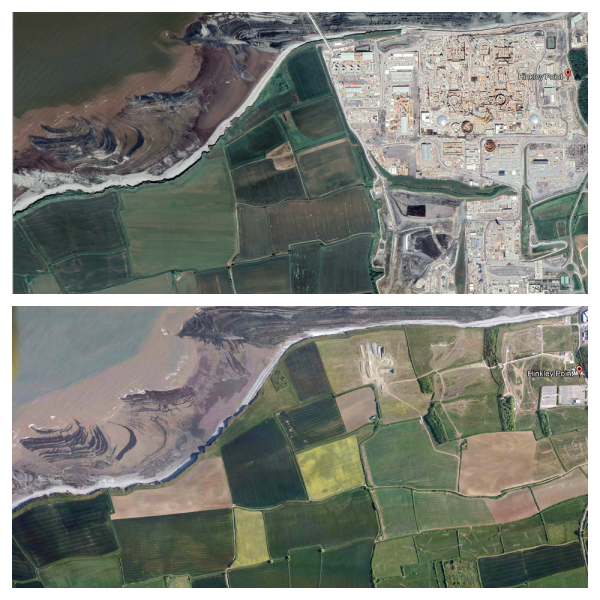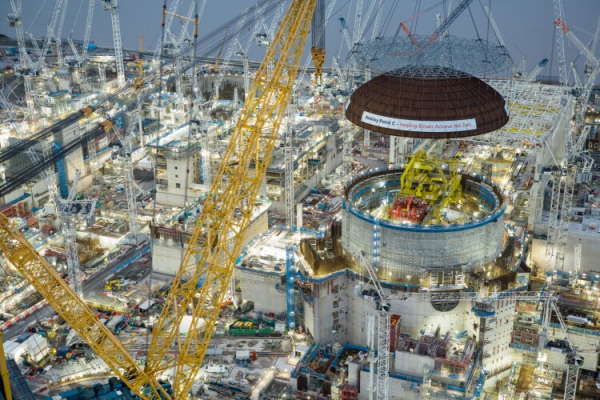The Hinkley Point nuclear power station is being constructed on Somerset farmland, 200 km west of London. It was announced in 2010. The UK gave an initial permit in 2012 and final approval in 2015 . Partners EDF Energy and China General Nuclear Power Corporation began construction in 2016.
The project was to cost £18 billion (C$35 billion) and Hinkley Point C nuclear power station was to begin generating power in 2025. Reports now say the facility will cost £46 billion (C$80 billion) and may not produce electricity until 2031.
As Prof. Bent Flyvbjerg said, “Over Budget, Over Time, Over and Over Again.”

In 2017, the UK’s National Audit Office concluded:
[Government] has committed electricity consumers and taxpayers to a high cost and risky deal in a changing energy marketplace. We cannot say the Department has maximised the chances that it will achieve value for money.
The deal for Hinkley Point C has locked consumers into a risky and expensive project with uncertain strategic and economic benefits…

The NAO message should sound familiar. Years ago, almost the same statements were made about British Columbia’s Site C hydropower project here at IN-SIGHTS and by others commentators. We were asking for public projects to deliver appropriate value for money while imposing the least environmental and social costs.
Research into megaproject disasters suggests numerous potential causes. These include:
- promoters consciously underestimate project costs to gain approval,
- political officials approving projects are not qualified,
- financial and engineering details are kept secret during construction,
- procurement policies are suboptimal,
- ongoing project governance is ineffective,
- on-site project management is incompetent.
Is fraud involved in megaproject budget disasters? Yes, if you accept the Merriam-Webster definition of the word:
FRAUD:
1a — intentional perversion of truth in order to induce another to part with something of value.
1b — an act of deceiving or misrepresenting.
The likelihood of fraud in public projects increases when they are poorly conceived and badly managed. Vigilance and transparency are crucial defences. The chance of fraud decreases if certain procedures are followed:
- project details, budgets, contracts, and progress reports are quickly made available for public review,
- citizens, community groups, and independent experts are continuously involved,
- fully transparent procurement policies are in place with frequent reporting,
- project-specific independent audits are ongoing, with detailed results regularly made public,
- monetary incentives and personal protection is available for whistleblowers.
Of course, politicians hesitate to put in place systems that reveal project mismanagement. They correctly believe that citizens are inured to budgets rising over, over and over again.
Ultimately, the public is to blame.

Categories: Budget & Estimate Disasters, Site C



Meanwhile, Wyoming — the USA’s biggest coal producer, and a Republican state — is also running a parallel green campaign.
For one, Bill Gates is planning to set up a sodium-cooled nuclear plant. On CBS’s Face the Nation last week, he said it would cost $10 billion. Once approved, he hopes to copy and paste the plants.
As well, a huge wind farm is in the planning stages, to harness the steady continental winds that channel through the state.
Thirdly, an innovative company has built mini-generator plants that harness gas that is being flared off and use it to power data centres that sit on-site.
https://www.cbsnews.com/news/wyoming-energy-innovation-60-minutes/
https://apnews.com/article/bill-gates-nuclear-terrapower-wyoming-climate-change-electricity-23176f33200b22b9ede7f4ccf4f2ec3b
LikeLike